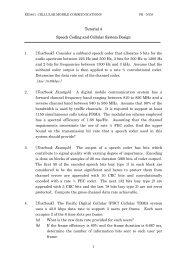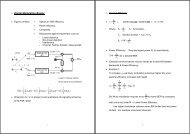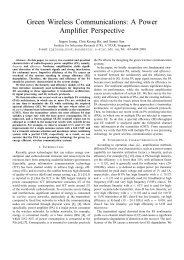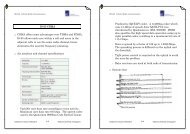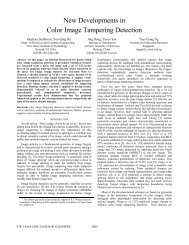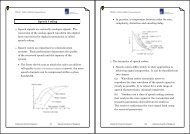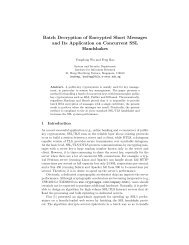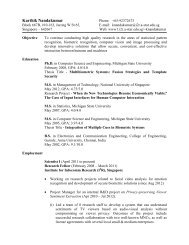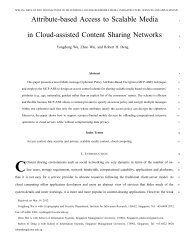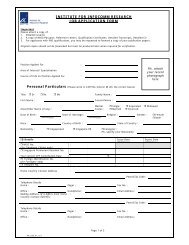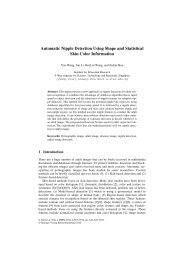Cellular Systems Cellular Concepts The cellular concept was a ...
Cellular Systems Cellular Concepts The cellular concept was a ...
Cellular Systems Cellular Concepts The cellular concept was a ...
Create successful ePaper yourself
Turn your PDF publications into a flip-book with our unique Google optimized e-Paper software.
EE5401 <strong>Cellular</strong> Mobile Communications<br />
EE5401 <strong>Cellular</strong> Mobile Communications<br />
Channel Assignment Strategies<br />
<br />
Channel allocation schemes can affect the performance<br />
of the system.<br />
Fixed Channel Allocation (FCA) :<br />
• Channels are divided in sets.<br />
• A set of channels is permanently allocated to each cell<br />
in the network. Same set of channels must be<br />
assigned to cells separated by a certain distance to<br />
reduce co-channel interference.<br />
• Any call attempt within the cell can only be served by<br />
the unused channels in that particular cell. <strong>The</strong><br />
service is blocked if all channels have used up.<br />
• Most easiest to implement but least flexibility.<br />
• An modification to this is ‘borrowing scheme’. Cell<br />
(acceptor cell) that has used all its nominal channels<br />
can borrow free channels from its neighboring cell<br />
(donor cell) to accommodate new calls.<br />
• Borrowing can be done in a few ways: borrowing from<br />
the adjacent cell which has largest number of free<br />
channels, select the first free channel found, etc.<br />
Institute for Infocomm Research 71 National University of Singapore<br />
• To be available for borrowing, the channel must not<br />
interfere with existing calls. <strong>The</strong> borrowed channel<br />
should be returned once the channel becomes free.<br />
Dynamic Channel Allocaton (DCA) :<br />
• Voice channels are not allocated to any cell<br />
permanently. All channels are kept in a central pool<br />
and are assigned dynamically to new calls as they<br />
arrive in the system.<br />
• Each time a call request is made, the serving BS<br />
requests a channel from the MSC. It then allocates a<br />
channel to the requested cell following an algorithm<br />
that takes into acount the likelihood of future blocking<br />
within the cell, the reuse distance of the channel and<br />
other cost functions ⇒ increase in complexity<br />
• Centralized DCA scheme involves a single controller<br />
selecting a channel for each cell. Distributed DCA<br />
scheme involves a number of controllers scattered<br />
across the network.<br />
• For a new call, a free channel from central pool is<br />
selected based on either the co-channel distance,<br />
signal strength or signal to noise interference ratio.<br />
Flexible channel assignment<br />
Institute for Infocomm Research 72 National University of Singapore



